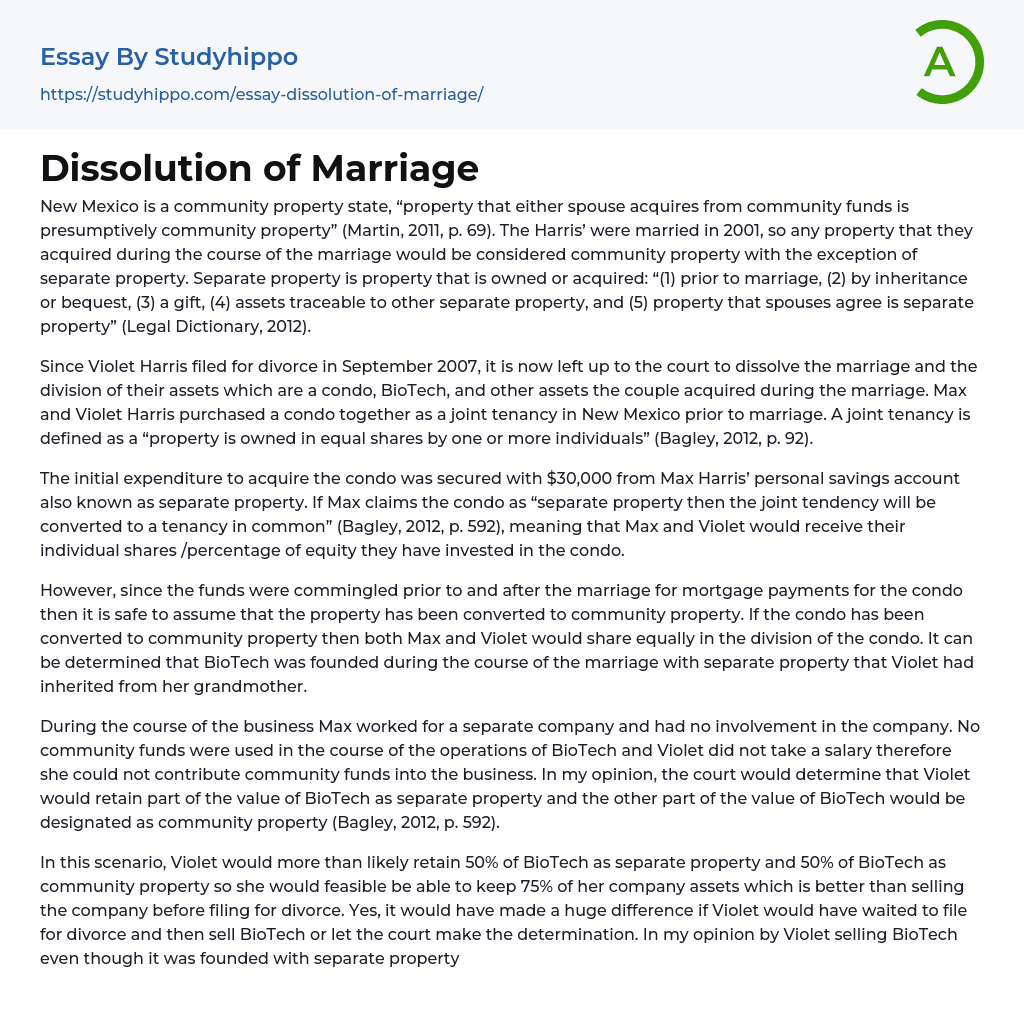According to Martin (2011, p. 69), New Mexico is a community property state, meaning that any property acquired from community funds is considered community property. The Harris' have been married since 2001, which means that any property they obtained during their marriage is community property, except for separate property. Separate property includes property obtained or owned before marriage, through inheritance or bequest, by gift, from assets traceable to other separate property, or property agreed upon by both spouses to be separate (Legal Dictionary, 2012).
The court has the responsibility of finalizing the divorce between Violet Harris and Max Harris, which was filed in September 2007. As part of the dissolution process, the court will determine how their assets, including a condo, BioTech, and other acquired assets, will be divided. Prior to
...their marriage, Max and Violet Harris jointly purchased a condo in New Mexico, which is considered a joint tenancy according to Bagley (2012, p. 92), meaning that it is owned equally by both individuals.
The condo was initially purchased using $30,000 from Max Harris' personal savings account, which is considered separate property. If Max designates the condo as separate property, the joint ownership will be changed to a tenancy in common. This means that Max and Violet will receive shares of equity proportionate to their individual investments in the condo.
The funds were mixed together before and after the marriage for mortgage payments for the condo, indicating that the property is now considered community property. As a result, both Max and Violet would have equal ownership of the condo. It can be inferred that BioTech was established during
the marriage using separate property inherited by Violet from her grandmother.
During the course of the business, Max had no involvement in BioTech, as he worked for a separate company. No community funds were used in BioTech's operations. Violet did not take a salary, so she could not contribute community funds to the business. In my opinion, the court would determine that Violet would retain part of the value of BioTech as separate property, while the other part would be designated as community property (Bagley, 2012, p. 592).
In this situation, Violet is likely to retain 50% of BioTech as separate property and 50% of BioTech as community property. This means she would be able to keep 75% of her company assets. This is a better outcome compared to selling the company before filing for divorce. It would have made a significant difference if Violet had waited to file for divorce and then sold BioTech or let the court decide. According to my viewpoint, when Violet sold BioTech, even though it was initially established with separate property, it became converted into income earned during the marriage, which is considered community property.
- Business Law essays
- Contract essays
- Consumer Protection essays
- Property essays
- Ownership essays
- Agreement essays
- Common Law essays
- Contract Law essays
- Justice essays
- Security essays
- Tort Law essays
- United States Constitution essays
- Crime essays
- Lawsuit essays
- Treaty essays
- Family Law essays
- Marijuana Legalization essays
- Constitution essays
- War on Drugs essays
- Court essays
- Jury essays
- Police essays
- Protection essays
- Community Policing essays
- Criminal Law essays
- Judge essays
- Lawyer essays
- Employment Law essays
- Copyright Infringement essays
- Injustice essays
- Intellectual Property essays
- Breach Of Contract essays
- Jurisprudence essays
- Social Injustice essays
- Juvenile Justice essays
- Internet Privacy essays
- Cyber Security essays
- Bill Of Rights essays
- Civil Liberties essays
- First Amendment To The United States Constitution essays
- Fourth Amendment To The United States Constitution essays
- Second amendment essays
- Animal Cruelty essays
- Law Enforcement essays
- Juvenile Justice System essays
- Surveillance essays
- Forensic Science essays
- Crime Prevention essays
- Criminal Justice essays
- Criminology essays




